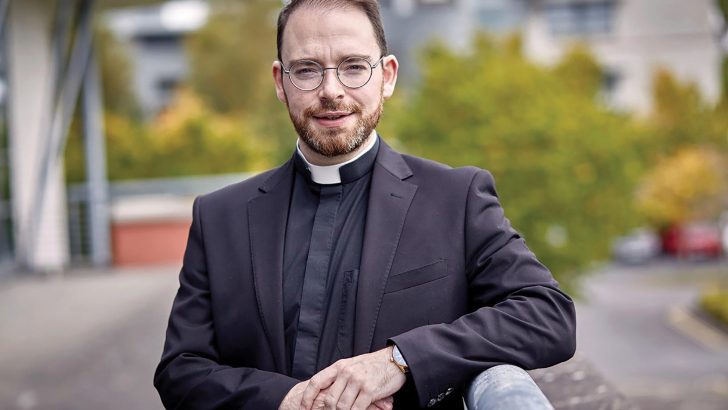Personal Profile
While he finds himself ministering to the vibrant, albeit restricted, student body at Letterkenny Institute of Technology (LYIT) these days, Fr Liam Boyle’s beginnings didn’t indicate this setting in later life.
“As a young child, or even as a young teenager, I didn’t have any strong faith. There were certainly points where I did not believe in God,” Fr Liam tells The Irish Catholic.
Explaining his background, he says, “I didn’t come from a traditionally strong, Catholic family,” and this left room for movement in his mind.
“Just through my own reading, I was interested in astronomy and all that, and that led me to believe or hold the opinion that God did not exist, nor was he necessary in the explanation of the creation of the world or the universe,” he says.
Science and faith
Fr Boyle walked a road that many young men and women walk today, believing science and faith to be incompatible. It wasn’t until later that he realised he was mistaken, and that the two could be reconciled.
“I had a naturally inquisitive mind and as I was exploring it more, I began to realise or I formed the opinion that….there became a point at which there was something missing at the very first instance of the creation of the universe. Now, I was amazed years later at secondary school when we were looking at creation in religion, that this opinion was held by many other people, for example, by St Thomas Aquinas. The unmoved mover or the uncreated creator,” he shares.
“That notion, that interface between faith and science is still something that interests me.”
A thoroughly intellectual beginning to a faith journey, Fr Boyle’s understanding of deep matters has benefitted as a result – a skill sure to aid his interaction with the youth.
“That while science offers a scientific explanation for the creation of the universe, scripture or revelation offers another aspect, another view of how creation came about. That the creation stories that we hear in the Bible are equally true, but they explain the creation of the universe in an unscientific way, because it was written by people who were not concerned, nor were they able to know how the universe was created in a scientific way.”
He continues, “I mean, even in Genesis, God created man and woman in his image and likeness. I don’t think science can adequately give an answer or explanation as to why humans love or have emotions, or why we can be moved to such acts of greatness, such great acts of kindness and charity to other people. That we have this divine spark within us.”
Anxiety
With soaring levels of depression, anxiety, and suicide among the young, and at large in society today, an ability to convey even a sample of the meaning that the Bible holds is crucial for anyone seeking to evangelise the culture today.
However, our Faith also informs us that knowledge is not enough; it ultimately comes down to a relationship with God in Christ. This is a fact Fr Boyle is perfectly aware of. As his understanding of the Faith grew, he moved from abstract musings to concrete devotion, reading books about the Faith and “praying the rosary very simply at night”.
Once these devotions took root in him, it wasn’t long until he was compelled along the priestly path – ordained in 2014, he was posted to Ardara parish for nine months where he learned from an “older and wiser parish priest”. From there, he was given a place at the edge of the world on Arranmore Island.
“There was a small, strong community there – the people there had a very strong sense of who they were,” he tells, informing that the Church had a large role to play in that process.
There’s a sense that God prepared Fr Boyle beforehand for his LYIT campus ministry, by engaging him intellectually first through his re-version, and then proceeding to equip him with the skills and experience necessary for catering to a small community in need of guidance, through his stints at Ardara and Arranmore.
Chaplaincy
After four years on Arranmore, Bishop Alan McGuckian asked him if he’d be interested in taking up chaplaincy in LYIT.
Campus ministry seemed a daunting prospect for Fr Boyle, for a couple of reasons:
“In seminary, you’re preparing yourself for parish ministry, where, in a sense, you know what to do. There’s been a system laid out for decades of how you are a priest in a parish, you know? There are duties you have to perform. In chaplaincy in a third-level institution, it’s very much a blank slate. While there is Mass – there’s Mass in the IT every morning, and then there’s obviously the ministry that you offer to the bereaved members of the college community – after that, it’s pretty much a blank slate. It’s kind of, where you find your role in the middle of all that.”
Fr Boyle found himself having to construct his own ministry, which was a job he entered into with advice from another department at his back: “I remember last year another department, another gentleman (who worked in) assisting students, and he said ‘Your role – you’re not important here, none of you are important here. You’re not important until someone needs you, and then you’re very important’,” he laughs as he recalls it.
“I think that sums up chaplaincy. A quiet, hidden presence, that gives an assurance…it’s very much being available.”
Having ranged from the lows of atheism to the highs of faith, and from the ruggedness of Arranmore to the comparatively cosmopolitan Letterkenny, Fr Boyle is modelling himself after the words of St Paul, “I have become all things to all men” (1 Cor 9:22).


 Fr Liam Boyle
Fr Liam Boyle 